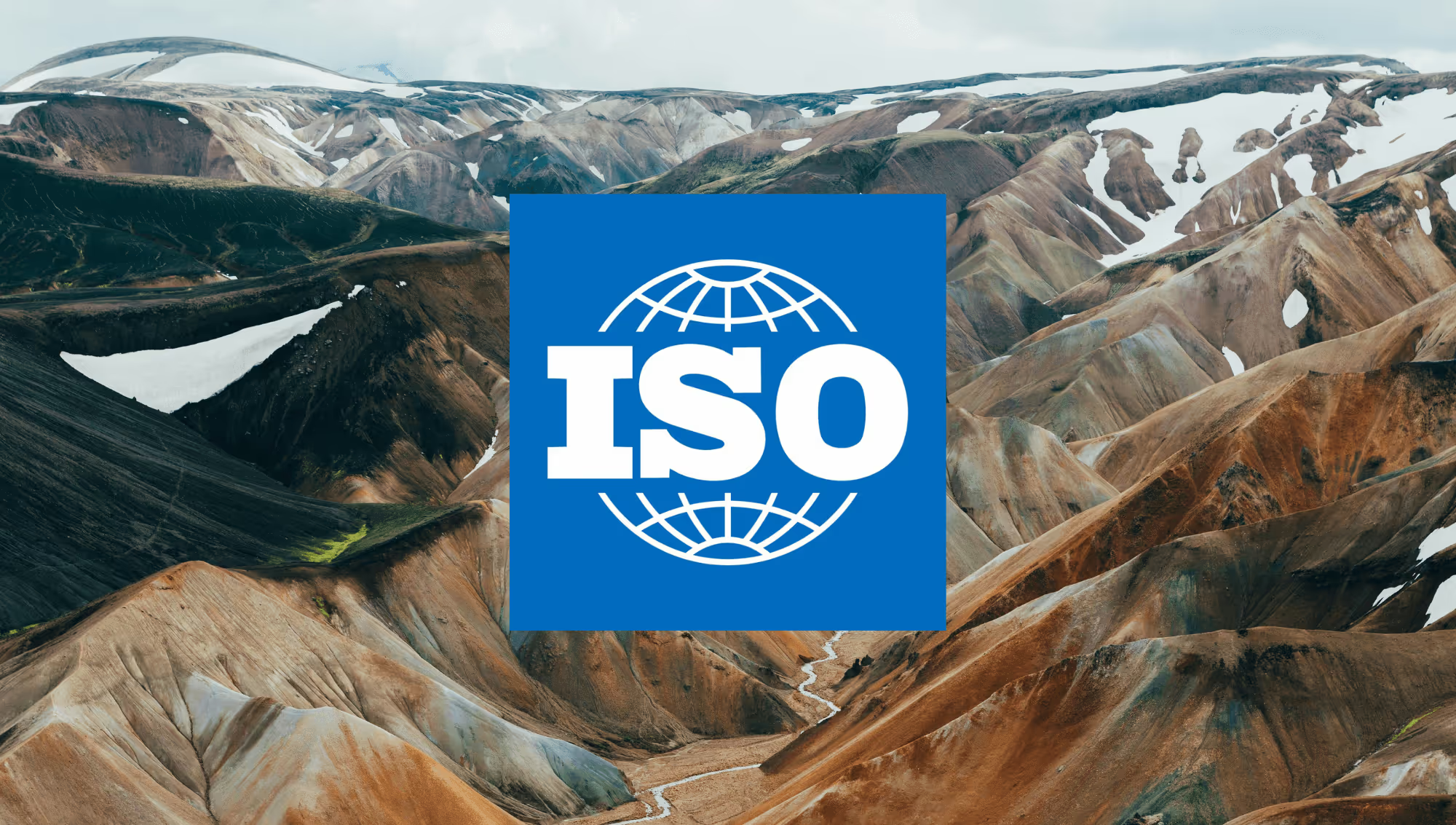ISO standards are international standards that help businesses adopt best management practices.
They cover various areas, including sustainability, which is the focus of this article.
The majority of ISO standards can be certified by independent third party organizations, but some only share a framework to follow.
These standards are acclaimed by businesses. If we look at the very popular ISO 14 001 standard on the environment, in 2023, in France, 3,176 companies and organizations obtained certification from AFNOR (French Standardization Association) and internationally, more than 420,000 companies and organizations in 2021.
These few figures show the extent and influence of these standards!
In this article, we asked our expert to select the 10 main ISO sustainability standards for you.
What is an ISO standard?
An ISO standard is a set of guidelines established by the International Organization for Standardization (ISO), which is one of the world's leading standards bodies.
To simplify, ISO standards will define a number of rules and best practices to indicate the best way to do things! From road safety to CSR management, ISO standards represent a guarantee of trust and quality in many areas.
ISO standards are based on the knowledge of experts in their field preferred, who understand the needs of organizations. These experts work together to determine best practices and ensure quality, safety, and efficiency across business sectors.
A standard is one tool among others for building a robust management system.
The benefits of ISO standards for businesses
As you will have understood, ISO standards provide a structured and internationally recognized framework to help companies improve their performance, guarantee quality and remain competitive.
Here are some benefits for businesses adopting ISO standards:
Top 10 ISO sustainability standards
ISO sustainability standards represent a set of international guidelines designed to encourage businesses to adopt environmentally, socially, and economically responsible practices.
They are essential for promoting sustainable resource management, reducing environmental impacts, and strengthening one's commitment to society and stakeholders.
Through a structured framework, these standards allow organizations to effectively integrate sustainability into their strategies and improve risk management, which means that they need to be renewed every three years.
We asked our experts to select the 10 main ISO sustainability standards for us.

ISO 14001 - Environmental Management System
One of the key sustainability standards is ISO 14001.
This international standard helps to Define your environmental management system (SME)!
An SME is a set of processes and practices that businesses put in place to reduce their negative impacts on the environment. Building a good SME helps businesses manage and improve their environmental performance.
A good SME should include:
- An environmental analysis to assess the activities of the company,
- An environmental policy engaging the company to always improve,
- An organizational structure to develop, implement, review and maintain the company's environmental policy.
Of course, while being in legal and regulatory compliance according to the framework that applies to the company.
For information, the ISO 14 001 standard is certifying, the environmental management system must be audited by an independent approved body.
One of the important points of this standard, which will be found in some other sustainability standards, is that it uses The Plan-Do-Check-Act (PDCA) approach as the main framework for structuring the environmental management system.
What is the Plan-Do-Check-Act:
- Plan (Plan): Identify opportunities to improve energy efficiency and set the right goals.
- Deploy (Do): Implement actions to achieve these goals.
- Check: Monitor and verify results to ensure that everything is going according to plan.
- Act: Adjust and improve actions to continue optimizing energy efficiency.
ISO 53001 - Sustainable Development Goals (SDGs)
ISO 53001 (under development) specifies requirements for integrating the United Nations Sustainable Development Goals (SDGs) into organizations' management systems. This standard complements and updates ISO 26000, 13 years after its adoption.
It is useful for businesses that want align their strategies and operations with the SDGs.
ISO 26000 - Social Responsibility
ISO 26000 provides guidelines on social responsibility.
Unlike other standards, it is not certifying, but offers a framework for integrating social responsibility principles in company activities and decisions.
It is particularly useful for organizations looking to improve their social impact in a voluntary and proactive manner.
The standard, established by the International Organization for Standardization, sets out guidelines for CSR, around 7 central themes:
- the governance of the organization,
- human rights,
- working relationships and conditions,
- the environment,
- the loyalty of practices,
- consumer issues,
- communities and local development.
ISO 30415 - Diversity and Inclusion
ISO 30415 offers recommendations and best practices to help organizations improve their diversity and inclusion. It is not a certification standard.
These guidelines invite create and maintain inclusive work environments Where each individual is respected and valued, regardless of differences in age, gender, ethnicity, physical ability, or sexual orientation.
The key points of the ISO 30415 Standard:
- Promoting diversity through a diversity and inclusion policy, training sessions, recruitment practices that promote diversity, etc.
- Promoting inclusion by ensuring that each member of the organization feels included and respected, with equal opportunities for development and progression
- Policies and practices: providing a framework for develop inclusive policies and practices, ranging from recruitment to training, talent management and organizational culture.
- Stakeholder engagement: involve not only employees, but also partners, suppliers, and customers, to create an inclusive and respectful collaborative environment.
ISO/IEC 27 001 - Information Security
The ISO/IEC 27001 standard is an international standard that specifies the requirements to establish, implement, maintain, and improve an information security management system (ISMS). It helps organizations to protect their sensitive data in a systematic and effective manner.
This standard is certifying and it may be requested by some customers or partners.
The key points of the ISO/IEC 27001 standard:
- Information Security Management: identify, assess, and address information security risks.
- Define a clear security policy which describes information security goals and guidelines.
- Implement specific controls to protect information, based on the results of the risk assessment. The standard provides a list of 114 possible checks.
- Businesses must regularly monitor and review their ISMS to ensure that it is effective and that it is constantly improving.
ISO 14007 and ISO 14008 - Assessment of Environmental Costs and Benefits
The ISO 14007 and ISO 14008 standards, which are not certifying, are complementary, they help companies to better understand the financial implications of their environmental impacts
The ISO 14007 standard gives guidelines for determine the costs and benefits associated with their environmental impacts and ISO 14008 complements this standard by proposing methods for converting environmental impacts into financial terms.
These standards allow businesses to make more informed decisions and become aware of the environmental cost of their activities.
ISO 20400 - Responsible Purchasing
The ISO 20400 standard, also known as "Responsible Purchasing Standard" is not certifying. It offers a frame of reference for encourage ethical and transparent business practices throughout the supply chain.
It allows structure and formalize commitments and practices sustainable development within the supply chain, while promoting transparency and social and environmental responsibility. This standard also helps businesses rethink their supply chains and engage in responsible partnerships.
ISO 37001 - Anti-Corruption Management
ISO 37001 is the standard for anti-corruption management systems, it helps organizations to prevent, detect and deal with acts of corruption.
It defines specific requirements, such as the implementation anti-corruption policies, staff training, risk management, control procedures and financial transparency.
Although ISO 37001 is not mandatory, it can be used by organizations as a frame of reference to demonstrate their commitment to fighting corruption.
This standard is particularly useful for businesses seeking to improve their governance and to minimize the risks associated with corruption.
ISO 50001 - Energy Management System
ISO 50001 is a voluntary, non-certifying standard that offers a framework for deploying an energy management system (EMS) effective.
This standard is very interesting for businesses, as it allows to identify sources to reduce energy costs, maximize its energy efficiency and at the same time reduce its carbon footprint.
The ISO 50001 standard, based on the model of the ISO 14001 environmental standard and uses the PDCA (Plan-Do-Check-Act) approach to analyze energy uses and consumption, identify the main energy uses and find opportunities for improvement.
The ISO 50001 standard requires a strong commitment from management to support initiatives and encourage businesses to strive for continuous improvement.
ISO 45001 - Health and Safety at Work
ISO 45001 is the standard for occupational health and safety (OSH) management systems. It provides a framework for identify hazards, assess and control risks related to health and safety at work.
To obtain certification, the company must have your occupational health and safety (OSH) management system evaluated by an accredited certification body.
Here are the steps to obtain ISO 45001 certification:
- Implement an occupational health and safety management system in accordance with ISO 45001,
- Conduct an internal audit to verify the conformity and effectiveness of the system,
- Certification Audit: A certification body carries out an audit in two steps:
- Step 1: Documentation review
- Step 2: On-site assessment
If the audit is successful, you will get certified!
Remember that The standard values the search for continuous improvement, we advise you to carry out audits to maintain compliance and every three years, you can renew the certification with a new audit.
Conclusion
ISO standards allow companies to use the best practices in the field to build their management system.
We advise you to follow them on all the sustainability issues that concern you!
These international frameworks will allow you to anticipate regulations, improve your image with your stakeholders and give you points for various certifications and evaluations such as EcoVadis.
Bon à savoir : Lorem ipsum dolor sit amet, consectetur adipiscing elit, sed do eiusmod tempor incididunt ut labore et dolore magna aliqua. Ut enim ad minim veniam, quis nostrud exercitation ullamco laboris nisi ut aliquip ex ea commodo consequat. Duis aute irure dolor in reprehenderit in voluptate velit esse cillum dolore eu fugiat nulla pariatur.


.avif)


